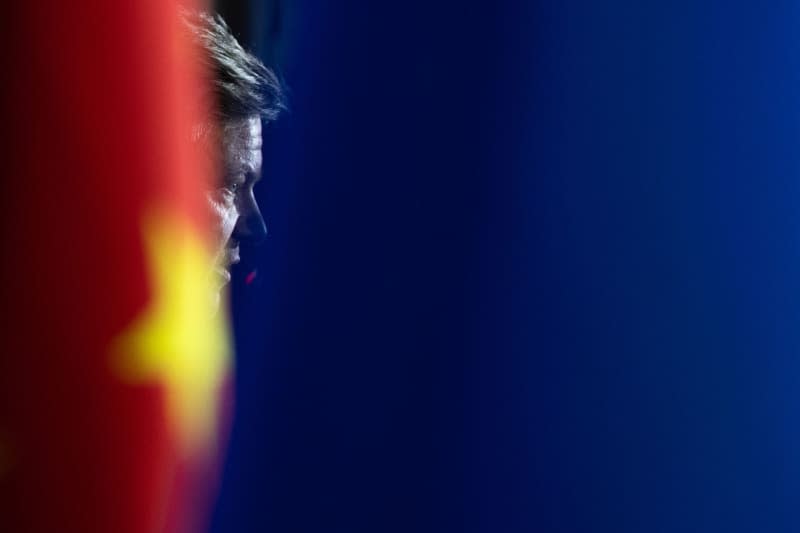German vice chancellor warns China of consequences of Russia stance

- Oops!Something went wrong.Please try again later.
- Oops!Something went wrong.Please try again later.
German Vice Chancellor Robert Habeck on Saturday again warned the Chinese government of the economic consequences of its support for Russia.
German and European security interests are directly affected by Russia's war against Ukraine, Habeck said in Beijing at a meeting with Chinese government representatives on climate issues.
Habeck, who also serves as Germany's economy minister, was echoing similar comments he made on Friday.
The Chinese side was led by Habeck's counterpart, Zheng Shanjie, the chairman of the powerful National Development and Reform Commission (NDRC). The authority is tasked with steering the development of the Chinese economy.
"We would proceed differently and certainly not quite as hard when analysing where we have dependencies on raw materials and technical goods if this war or China's support for Russia in this war did not exist," Habeck emphasized.
The issues cannot not be separated, he added: "Our relationship, our direct relationship, has already been negatively affected."
At a press conference in Shanghai later on Saturday, Habeck highlighted the risk of goods that could be used to harm Western interests ending up in Russian hands.
Dual-use goods which can be used both in civilian and military settings are currently reaching Russia via China, he warned.
"These are technical goods that can be used on the battlefield," he said.
Chinese trade with Russia grew by 40% over the previous year, Habeck added, arguing that around half of the growth could be attributed to dual-use goods.
Dispute over electric car tariffs
In the trade dispute over tariffs on cheap Chinese electric cars, Habeck called on the Chinese side to take the European Commission's findings seriously.
The Brussels authority accuses the Chinese government of unfair subsidies and has threatened to impose high tariffs. China retaliated by announcing an anti-dumping investigation into imported products from the European Union, involving pork and by-products.
However, it was only on Thursday that China accused the European Commission of asking far too detailed and far-reaching questions in the subsidy investigation.
In Beijing, Habeck warned against trade barriers and the sealing off of markets, but also against unfair competition with state favouritism towards companies. Neither Germany nor China could have any interest in this, he said.
Habeck emphasized that the threatened EU tariffs were not punitive tariffs like those imposed by the United States, Brazil or Turkey. Rather, they should ensure a level playing field, he said.
"This is an equalization of the advantages granted and that is why it is important to first take the opportunity provided by this report and talk about it, negotiate about it," said Habeck. This could either lead to a different result or even a change in course.
"Otherwise, it will certainly not be possible to prevent these countervailing duties from coming into force in order to safeguard common market access," Habeck said.
Zheng, on the other hand, called Europe's approach "unacceptable." In the long term, it would reduce the prosperity of European consumers and harm the development of the European automotive industry, he said, adding that it is also not in line with efforts to reduce greenhouse gases.
The technical lead of Chinese car manufacturers is hard-earned and not the result of subsidies, said Zheng. His country also exports only 12.5% of its electric cars and sells them abroad at a higher price than at home.
Zheng called on Germany to show leadership and for the Berlin government to correct what he labelled Europe's wrong approach.
Habeck: 'Genuine and contentious dialogue'
Speaking later in Shanghai after meetings with Chinese Commerce Minister Wang Wentao and Industry Minister Jin Zhuanglong, Habeck said the talks were carried out in a "very open and intense atmosphere."
"This allowed the arguments to be exchanged bluntly," he added, in what he termed a "genuine and also contentious dialogue."
The vice chancellor said he was not criticizing China for over-producing cars, nor for its state subsidies. The problem arises when government funds are used to promote exports, Habeck argued.
"I don't want to have tariffs because I believe in open markets," he continued.
Wang said that China is ready to negotiate with the European Commission, but said that some countries are weaponizing talks over economic and commercial co-operation.
Should Europe decide to act unilaterally, China will be ready to take "all necessary measures," Wang added.
Wang was due to speak to European Union trade commissioner Valdis Dombrovskis via video conference later on Saturday, as was Habeck.
Habeck concluded by calling for a solution to the tariff dispute: "For Europe, I can say the doors are open."

